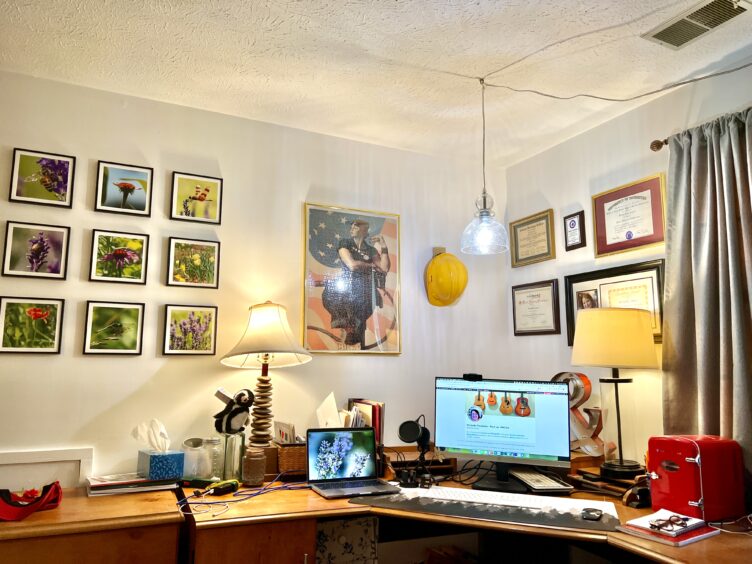Space. It’s altogether easy to understand, and an enigma in so many ways.
In order to be productive, happy, and healthy, we often define our lives in terms of space: physical space, emotional space, and time.
Space is important.
Physical Space
We spend a lot of time at work. Usually 40+ hours a week, which is a lot of our waking hours. Being comfortable in our physical space is important. What is comforting to one person, though, may be quite the opposite for someone else. That said, here are some tips that may help you with your workspace to increase productivity (or at least maintain it).
- Use a comfortable chair. Even if you use a standing desk, you’re likely to sit at least some of the time. Having a chair that creates comfort is important. According to the Health Policy Institute at Georgetown University, “Nearly 65 million Americans report a recent episode of back pain. Some 16 million adults — 8 percent of all adults — experience persistent or chronic back pain, and as a result are limited in certain everyday activities. Back pain is the sixth most costly condition in the United States.” Having a comfortable chair helps.
- Declutter your space. Clutter can impede our ability to think clearly. An open work space allows us to focus on the task at hand without distraction by the other dozens of tasks that beg for our attention. Use a filing system, shelves, drawers, or even boxes to get organized, still have access to the things you need, and free your area for focus.
- Maintain a comfortable temperature. Whether you like your workspace warm or chilled, find a way to be comfortable in your office climate. This may mean investing in an air conditioning unit, fan, space heater, slippers, or a sweater. Find whatever you need to be comfortable, without shivering or sweating.
- Control noise. Noise can be a huge distraction to productivity. Whether you’re working at home with children running around, in an office with noisy coworkers, or in a coffee shop with other people talking, there are ways to control noise distractions. If you’re in your own space, consider background music that you like, a white noise machine (or through an AI device or app), or a closed door and acoustic paneling. If you’re in a more public space, noise canceling headphones or ear buds are really helpful – with or without music playing.
Emotional Space
Emotional space is the ability to be creative within ourselves without succumbing to external pressures and forces. In a nutshell, it’s how we create boundaries with others – and respect the boundaries of others – in order to function well.
If “good fences make good neighbors,” (Mending Wall, by Robert Frost), then good boundaries make good relationships.
Creating emotional space requires us to reflect on where our boundaries are and then enforce them with others. In a work environment this is most often between us and our supervisor, coworkers, and customers.
Boundaries can be enforced with time blocking, turning off communication notifications in peak work times, organized and agreed-upon expectations, and even communicating topics that you won’t engage in (like coworkers’ love lives and childraising).
Establishing job descriptions and abiding by what is with them is also an example of good boundary-setting.
Recognizing that sometimes boundaries need to be flexible is important. Deadlines, employee absences, and work emergencies may require us to flex our boundaries from time-to-time, but this should be the exception, and not the norm.
Time
There are situations where time is the most important space we have. And though time is endless, it is also finite in how we use it.
Time is an important commodity, and too often we rush through things without giving ourselves the time we need.
We need time to learn. Whenever we begin something new (a job, a hobby, life changes (like parenting), new tasks, etc.) we need time to learn how to do the things right before we actually do the things. Time to learn is important.
We need time to heal. No matter what part of our life something happens in, it affects all parts of our lives. That includes illness (our own or a loved one’s), the death of someone close to us, changes in our situations (divorce, break-up, empty nest, losing a job, losing a home, accidents, and more). Time to heal is important.
We need time to rest. None of us are robots. We all need time to relax and recharge. Taking time away from work and stress means time to breathe and rejuvenate. Whether that’s sleeping in on the weekend or taking a vacation in a foreign place, we need rest. Time to rest is important.
Space, In All Its Forms
If I’m being honest, this post is as much a reminder to myself as it is to share ideas with you. I’m equally as guilty (if not moreso) than many others of not affording myself the right physical space, emotional space, and time to be rested, creative, and an active contributor.
I recently redecorated my home office. I created a space with openness, familiar and meaningful objects, and lots of light. It is exactly the right space for me to be productive and happy.

I’m taking vacations. I’m planning time away. And I’m indulging in hobbies I love.
And I’m giving myself the space that I need to heal from changes and tragedy in my own life.
I wish you space. I wish you time. I wish you happiness.

